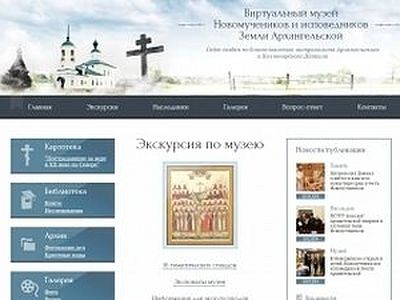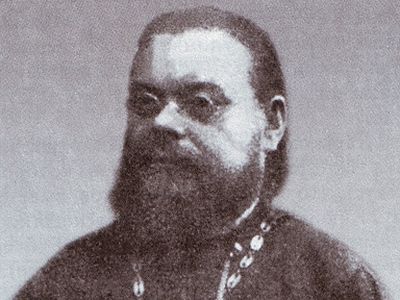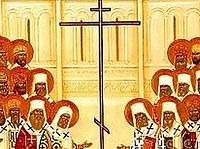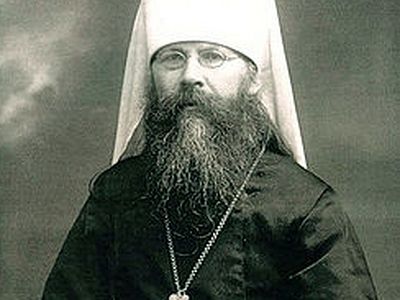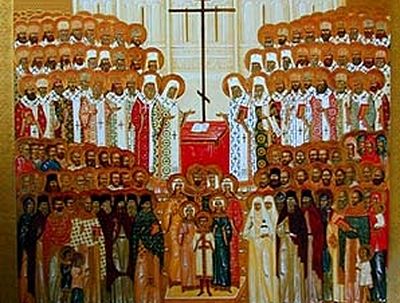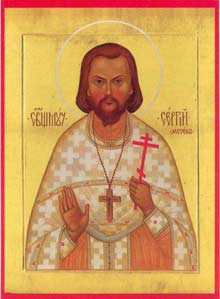 New Priest-Martyr Sergei Mechev
New Priest-Martyr Sergei Mechev
We must choose that good
part, which will not be taken away from
us.
(Luke 10: 42).
At the onset of Great Lent, on the Sunday commemorating Adam’s expulsion from paradise, we present a letter written by New Priest-Martyr Sergei Mechev, the son of Righteous Fr. Alexei Mechev. This letter, a lamentation over the persecution of the Church in communist Russia, calls us also to repentance; for great troubles come to us, to our Church, and to our nation when we neglect Christ’s commandments.
* * *
To my fellow suffering and orphaned ones, I send my blessing for the beginning of Great Lent.
I feel that you have now been waiting long for a word of consolation from me, but my lips have become silent; within me my spirit has faded and my heart is heavy. Our earthly heaven has ended for us. How can we not weep, not be in anguish and in sorrow?
Gird yourselves and lament, ye priests; howl, ye ministers of the altar; come, lie all night in sackcloth, ye ministers of my God: for the offering of the wheat and of the wine is withholden from the house of your God (Joel 1:13).
The nature of man, created in the image of God, seeks to dwell with its own kind in joy and especially in sorrow. It is not good that the man should be alone: let Us make for him a help suitable for him, said the Creator at the dawn of man's history. Even our Lord Jesus Christ, in the anguish of His own death, prayed to His Father in the garden of Gethsemane, until there appeared perspiration and blood. Being strengthened by an angel, he, in a human way, longed for support from those who were near and loving, with whom He had spent His earthly life of service to mankind: "My soul is exceeding sorrowful, even unto death! Wait here, and watch with Me."
I am sinful and my soul is empty, having once been nourished by your constant prayers, your burning, your service with me in church. Now all alone and deserted, I especially feel my unworthiness and abandonment.
To my missing of the church, I add my constant missing of all of you, and I admit my great guilt before each one. Your sufferings and tribulations have stood constantly before my eyes. I found no consolation for myself, as Hezekiah: Like a crane or a swallow, so did I chatter; I mourn as a dove; mine eyes fail with looking upward. O Lord, I am oppressed: undertake for me (Is. 38:14).
I know that you are praying for me, and your prayers offered in such grief have gone to the Lord; and He has revealed to me a sinner—His mercy. Penitent hymns have touched my depressed heart, and the words of the great ascetic have given me a proper direction for my sufferings: "He who without prayer and temperance wishes to overcome temptations, shall not rebuke them, but shall become more entangled in them" (St. Mark the Ascetic).
All my inner being has been striving for the Lord. He, only He, can help me, for He maketh sore, and bindeth up; He woundeth, and His hands make whole (Job 5:18).
I am Thine, save me. Make whole my soul, for I have sinned against Thee. In answer, the words of a discerning man of ancient times have come to my heart: Give not over thy soul to sorrow, and do not torment thyself with brooding, for sorrow hath killed many, and there is not profit therein (Wisdom of the Son of Sirach 30:22-25).
And set thy heart and become strong in time of adversity; everything that happeneth with thee, accept with willingness and in the injustice of thy indignation be long-suffering (Wisdom of the Son of Sirach 11:24).
With the increase of the sufferings of my heart, Thy benefactions, Lord, have made my soul rejoice.
By your prayers, the words of the Psalmist have begun to be realized in me: Amid the thronging sorrows of of my heart, Thy consolations enrapture my soul (Psalm 93:19).
Now with His help I can write for you words of consolation, and thereby in a small measure lessen your sufferings.
The judgement of God is taking place upon the Russian Church. It is not by coincidence that the external aspect of Christianity is being taken away from us. The Lord is punishing us for our sins, and thereby is leading us towards a cleansing. What is happening is unexpected and incomprehensible for those living by the standards of the world. Even now they still strive to bring everything down to an external level, attributing everything to causes which lie outside the Church. Yet, those who live for God have had everything revealed to them long beforehand. Many Russian ascetics not only foresaw these dreadful times, but also witnessed about them.
Not in the external aspect did they see a danger for the Church. They saw that true piety is abandoning even the monastic centers; that the spirit of Christianity is departing in an undetectable way; that the most terrible famine is upon us—famine for the Word of God; that those who possess the keys to unlock this knowledge are not letting others enter; and that with the seemingly abundant monastic prosperity, Christianity is at the last breath of life. Abandoned is the path of experience and activity, by which the ancient fathers lived and which they passed on in their writings. There is no mystery of the interior life, for "the venerable ones have departed, and the truth has left the sons of mankind." From the outside there has begun a persecution of the Church, and the present reminds us of the first centuries of the Christian era. The Blessed Hierarch Philaret of Moscow, more than once in his talks with those close to him in spirit, pointed out that the time is long overdue for Russia to be in the same position as the ancient Christianity of the first centuries. He wept for the children who are to behold even worse things. The revelation about our time is especially well expressed by two hierarchs who have studied diligently the Word of God: Saint Tikhon of Zadonsk [+1783] and Bishop Ignatius Brianchininov [+1867].
"At present true piety has almost vanished, and we are left with only hypocrisy," said Saint Tikhon about the state of the Church in his time. He predicted the vanishing of Christianity in an unseen way due to the people's indifference to it. He warned that Christianity—being life, mystery and spirit—should not perish unnoticed from those who do not value this priceless gift of God. A century after him, Bishop Ignatius Brianchininov spoke of monasticism and the Church and defined their state: "We are living in turbulent times—the venerable ones have left the earth, and truth has become scarce amidst the sons of mankind. A famine for the Word of God has arrived; the keys to unlock this knowledge are in the hands of the Scribes and Pharisees and they are themselves not entering and not letting others enter. Christianity and monasticism are at their last breath. The image of Christian piety is at best being kept only in a hypocritical way. All strength for true piety has left, people have given up; one must weep and be silent" (Letters, 15).
Seeing in monasticism the barometer of the spiritual life of the entire Church, Bishop Ignatius claims the following about its condition: "One can admit that the consummation of the witness of the Orthodox Faith is coming to a final unwinding. The fall of monasticism is significant, and what will happen is unavoidable. Only the mercy of God can stop the morally corrupting epidemic. Perhaps it will stop it only for a short time, for the prophecies of the Scriptures must be fulfilled" (Letters, 245).
"With a sorrowful heart I behold the unstoppable fall of monasticism, which is the sign of the end of Christianity" (Letters, 251).
"The more time that passes, the more turbulent it is for Christianity as spirit, which in a way unseen by the vain and worldly masses—but clearly revealed to the one who struggles in himself—is departing from the heart of mankind, leaving everything ready for its destruction. —Those who are in Judea must run for the mountains" (Letters, 118).
Many of the ascetics of the 18th and 19th centuries looked upon the time of their lives as a period of calm before the storm for the Church of Christ. We must not forget that all this was said by them in times of complete external prosperity. Monasteries not only existed, but were well endowed; new monastic communities were constantly being formed; new churches were built; ancient ones were restored, renovated and rebuilt; and the relics of saints were revealed. The Russian people were praised as guardians of purity in Orthodox faith and genuine piety. No one could have ever perceived that the Church was in a critical state and the end was not beyond the hills. Only those who had come to the knowledge of the Kingdom of God, possessing it in their hearts, could perceive otherwise. With a heavy heart they beheld all that went on around them and, not finding the life given by Christ in what they saw, they predicted a final catastrophe.
"Only a special mercy of God can stop such a thing for a short time," said Bishop Ignatius Brianchinininov.
The mercy of God did hold it back. Before being extinguished, the lamp started to emanate a brighter light. This is what happened to the Russian Church. During the last century, the genuine light of [inward] Christian activity began to be kindled in certain monastic centers; and from them, as in the past, in the time of Saints Anthony and Theodosius of the Kiev Caves and Saint Sergius of Radonezh, this light began to shine upon the world. There began a return to the long-for gotten path of God-awareness, which had been followed by the great ascetics of the past.
Certain monasteries—with Optina Hermitage at the forefront—not only collected, translated, studied and published the patristic writings, but upon their experience they built almost a new monastic art. Bishops Ignatius Brianchininov and Theophan the Recluse not only read the ancient ascetics, but they themselves contributed to Christian literature, having understood the essence of Christian experience. Misunderstood, mocked, condemned as for some sort of novelty, monks proceeded to defend the experience of the ancient Fathers against the corruption of Christianity by worldliness. Monasticism again received the spirit, the fire was again lit where only recently there had been but a spark. The long-forgotten writings of the Fathers were were made into handbooks. The monks of ancient Egypt, the Thebaid, Palestine and the Syrian deserts were made teachers of life. The flame of the active Christianity of the new creation was spread from the monastics into the world. Many flocked to the renewed monastic centers which possessed eldership, and through these centers they partook of the way of ascetic experience.
The priests of parishes approached the monks, and, having received the patristic flame from them, they brought it to their churches. The character of preaching in the churcnes changed. The writings of the Fathers were heard from the pulpit as a way of life and not as some archaic moralistic past. The world was made closer to the monastery; the barrier between them was made to crumble. In parish churches the divine services were now given a new spirit by the typicon, with popular interest in it shown by the faithful, who now understood it. Repentance was made the essence of life. Many families took on a serious way of life sanctified by the frequent partaking of the Sacraments of Confession and Communion. Formalistic provincial parish life, with its yearly partaking of the Mysteries, was now changed at its core by this.
From the time of Saint Sergius there had not been such a life-giving movement. It seemed that such a spiritual experience, begun with such zeal by all, would envelope our whole land.
But, by other paths the Bridegroom has led His Bride, the Church: having Himself partaken of the cup of death, He now offers Her the rejuvenating torments of the Cross.
Here She is—spat upon, beaten and mocked. She is now being led up to Golgotha and nakedly is nailed to the Cross. For Her faithful children there is now opened a path of confession, martyrdom and most importantly of great trials and sorrow.
The fathers of Scetis once asked Abba Iskyrion, "What have we done," and he answered, "We have kept the commandments of God." The fathers asked, "What will those that will come directly after us do?" and he answered, "They will have only half of what we have." The fathers again asked, "What about those that will come after them?" "These," answered the elder, "shall not have monastic podvig [ascetic activity] at all, but they shall be caught in tribulations and have many trials and temptations, and shall become greater than us and our fathers."
Distinct sorrows, unheard of Temptations—this is the destiny of our time. Repentance and struggle with them— this is the meaning of our life. Having the visible side of Christianity taken away from us—this is what is most centrally signigicant for us. Exile, confinement, hard labor-— this is nothing compared to the closing of churches. Such confiscation of our churches, according to the Word of God, can be stopped by repentance.
Turn ye even to Me with all your heart, and with fasting, and with weeping, and with mourning: and rend your heart and not your garments, and turn unto the Lord your God: for He is gracious and merciful, slow to anger, and of great kindness, and repenteth Him of the evil. Who knoweth if He will return and repent, and leave a blessing behind Him; even an offering of the wheat and of the wine unto the Lord your God? (Joel 2:12-14).
But from where have we heard a universal call to repentance? Where have we seen the archpastors and pastors weeping rivers of tears between the porch and the altar to spare their people? (cf. Joel 2:17).
We have placed the diplomatic talents of the hierarchs on a more important level than the Word of God. On them we have placed hope, on them we have placed our salvation. By a lie we have tried to preserve the Kingdom of Truth.
The Lord has mocked them and unto the end is sending upon them His wrath. Is it not before our eyes that the joy and gladness from the house of God (Joel 1:16) is taken away?
They are withering, yes, withering away the visible aspect of the Church to its foundation.
My children, the judgement of God is taking place. Let us fall in repentance before the Lord and find within ourselves the strength to say with the prophet: I will bear the indignation of the Lord, because I have sinned against Him, until He plead my cause, and execute judgment for me: He will bring me forth to the light, and I shall behold His righteousness (Micah 7:9).
Our Lord is calling us to accept a new form of salvation. Many churches built by the hands of man, filled with many treasures, were kept open for centuries. At the same time many temples not made by human labor [Cf. II Cor. 5:1] were in a terrible state of decline and left unused. Now that the churches built by man's labor are being destroyed, in the repentant yearning for them are raised temples built by the hands of God. The flames of humble martyrdom are beginning to be ignited in all places, especially in the inaccessible regions. Hungry, impoverished, frozen, isolated from the world, on the barren earth, in the snow or in roadside cabins, without coffins and the sacred rites —are dying priests, monks and faithful laity. In the contrite temples of departing souls, prayers are raised for the entire Church, which has fallen to the love of the external. The rites and customs mean more than the spirit of the Church, which is not finding in itself, even in these times of distinct tribulations, the healing tears of contrition. Sparks of enduring confession are lit everywhere, from the Arctic Ocean to the scorching desert. In repentant weeping are praying those people who, through endurance of tribulations, have opened the temples of their hearts and who have been banished from serving in the temples of God!
Let us enter, beloved ones, into the cells of our souls, into the temple of our spirit, consecrated unto the Lord at the moment of our Baptism and sanctified by Him at the time of our first Communion. This temple of ours—no one can ever destroy it, except we ourselves. In it there is both priest and penitent. Its Table of Oblation is our heart, and upon it we can always with our tears consummate the great mystery of repentance. It is difficult for us who have let our invisible temple grow desolate, living by the visible church, accept from the Lord a new way of salvation. Let us cry and weep, not with tears of despair, but with tears of repentance, accepting all as what we deserve. Is it not the Lord Who sends this? Have not the more diligent from among us long ago taken to this path? Whether this is for a long time or is permanent—only the Lord knows. The visible side of Christianity is leaving us.
Let us stand aright, let us stand with the fear of God.
O my beloved little house of God! How much pure and unearthly joy have we received through thee! Our earthly Jerusalem, perpetually carrying us up unto distant Sion! Many more times will our eyes weep tears at the memory of our earthly paradise.
If I forget thee, O Jerusalem, may my right hand be. forgotten. May my tongue cleave to my throat if I do not remember thee, if I do not prefer Jerusalem as the chief of my joy (Psalm 136).
Great spiritual sensitivity is granted to you from the Lord. Your heart has not brought you to where there radiated the gleam of majestic divine services, where there were heard intricate melodies, from where there were preached learned sermons. Into a poor and tiny church each one of you has come, and each in his own time has perceived the truth of the way of the ancient Holy Fathers. In the approaching spring of the Russian Church you have become workers in Her vineyard. With what self-denial have you given up your youthful years, your years of strength and zeal and your years of tranquil old age, for the building of your temples in this repentant family of ours.
You are the living evidence, but also the participants of the last fading light, by the will of God, of the lamp of the Russian Church.
In the approaching turbulent times of trial ahead for the Church of Christ, I entreat our Lord, His Most Pure Mother and all of our Holy Saints to strengthen you and make you genuine workers in the vineyard of Christ.
My dear ones, Let us reveal ourselves in all things as ministers of God, in much patience, in afflictions, in necessities, in distress, in stripes, in imprisonments, in tumults, in labors, in watchings, in fastings" (2 Corinthians 6:5).
May God grant patience and consolation to you and may you live with oneness of mind amongst each other.
Priest Sergei Mechev Moscow, Spring, 1931
From: The Orthodox Word No. 132. (Reprinted with permission.)

